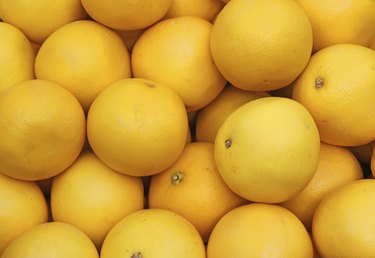Prescription medications are generally safe and effective, but many of them can interact poorly with certain foods. Blood pressure medications are one example of drugs that can be affected by the food you eat. Speak to your physician or pharmacist about what foods you should avoid if you're taking blood pressure medication. If you start a diet plan, speak with your physician to make sure it is safe.
Grapefruit Juice

Grapefruit and grapefruit juice may interact with a class of antihypertensive drugs called the calcium channel blockers, or CCBs. These include amlodipine, felodipine, verapamil, nifedipine, isradipine and nicardipine. CCBs are not the preferred treatment for high blood pressure, but they are effective at lowering blood pressure when other medications have failed. The breakdown of the CCBs may be blocked by grapefruit juice, leading to an increase in the amount of medication in the blood. Large amounts of grapefruit juice increase the effect of the medications, according to "Pharmacotherapy: A Pathophysiologic Approach." This may lead to an increase in medication side effects and toxicity effects. Grapefruit and grapefruit juice should be avoided if you take a calcium channel blocker.
Video of the Day
Video of the Day
Foods with Potassium
Amiloride is a potassium sparing diuretic used to prevent a decrease in your potassium level by other diuretics, such as furosemide, in the treatment of hypertension. The "Drug Information Handbook" explains that foods that contain potassium may cause hyperkalemia, which is a dangerously high potassium level. Foods that are high in potassium include bananas, cantaloupe, grapefruits, oranges, tomato juice, prunes, honeydew melons, molasses and potatoes. Consume few or none of these potassium-rich foods while taking amiloride. Ask how much potassium you can ingest daily. If your potassium level is high, your physician may adjust the dose of your diuretics and blood pressure medication.
Protein-Rich Foods
Propanolol is a beta-blocker used in the treatment of high blood pressure, as well as chest pain and irregular heartbeat. A diet that is high in protein may increase the rate at which propranolol is absorbed by the body, and this may lead to an increased affect of the medication. Many foods contain protein, including meat and dairy products. If your diet is high in protein, speak with your physician or pharmacist to make sure the food will not interfere with your medications. Ask your physician which foods you can eat with your dosage of propranolol.
Is this an emergency? If you are experiencing serious medical symptoms, please see the National Library of Medicine’s list of signs you need emergency medical attention or call 911.